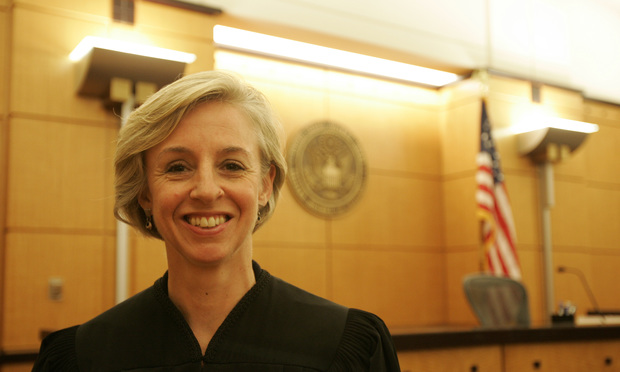Judge Orders Trade Secrets Defendant to Stop Doing Business With Allegedly Stolen Clients
A federal judge in Sacramento granted a preliminary injunction brought by Orrick Herrington & Sutcliffe's on behalf of ExamWorks, which will bar former employees of the medical exam provider from working with "100,000 potential customers" wrapped up in the trade secrets dispute.
June 04, 2020 at 08:49 PM
4 minute read
 Chief District Judge Kimberly Mueller (Photo: Jason Doiy)
Chief District Judge Kimberly Mueller (Photo: Jason Doiy)
A federal judge in California ordered former employees of an independent medical exam company embroiled in a trade secret spat to stop doing business with the provider's previous clients.
The order from U.S. Chief District Judge Kimberly Mueller of the Eastern District of California is a particularly punishing ruling to come out of the state, which is known for its employee mobility standards.
On Wednesday, Mueller granted Orrick Herrington & Sutcliffe's motion for a preliminary injunction on behalf of its client ExamWorks. The preliminary injunction extends a temporary restraining order against four former ExamWorks employees who ran its California operations and allegedly stole financial information, client and doctor lists, and business plans to launch a competitor.
The temporary restraining order, which is now extended until the case goes to trial, prevents Todd Baldini, Lawrence Stuart Girard, Abygail Bird and Pamella Tejada from "conducting business with any individual or entity that did business with ExamWorks before defendants stopped working there to the extent those individuals or entities are identified in the bundle of trade secret materials misappropriated by defendants," according to the opinion.
Daniel Chammas, of Ford Harrison in Los Angeles, represents the defendants in the case and did not respond to a request for comment late Thursday afternoon.
California judges tend to stop short of requiring companies to no longer work with clients tangled up in trade secrets disputes in part because of Sec. 16600 of California Business and Professions Code. The pro-competitive statute voids contracts restricting lawful business of any kind.
In addition to halting business with former ExamWorks clients, the preliminary injunction demands that defendants preserve evidence and submit their devices for forensic information, refrain from using the alleged trade secrets and return and destroy any copies of stolen information.
ExamWorks claims the former employees pocketed client and doctor information worth millions of dollars. The motion for a temporary restraining order filed in May asserts that the employees, after devising a plan to launch a competing business and stripping trade secrets, negotiated the best way to inconspicuously leave the company. "Was it best to go 'One at a time vs. together?'" according to the filing. "What would the explanation be for their departures?"
An Orrick team—made up of Robert Shwarts, Catherine Lui, Nathan Shaffer and Johanna Jacob—declined to respond to a request for comment on the record.
In opposition to the preliminary injunction, Chammas and Ford Harrison's Jenny Choi wrote that Baldini and Girard do not dispute that they took ExamWorks information while working for their company and do not oppose an injunction requiring them from disclosing confidential information or completing forensic scans of their devices.
"The proposed injunction, however, goes much farther than the law permits," they wrote, noting that in California, businesses can continue to work with trade secret customers and that defendants can even give notice to trade secrets customers that they are leaving the company to go somewhere else.
"The Conducting Business Provision is impermissibly broad, as it purports to prevent the Individual Defendants from doing business with more than 100,000 potential customers, without any showing that they were ever solicited by the Individual Defendants," they wrote.
Mueller, "[r]ecognizing the defendant employees' right to engage in lawful work as long as they are not misappropriating plaintiff's trade secrets," ordered the parties to participate in a settlement conference led by Magistrate Judge Kendall Newman, which she noted could take place via telephone or videoconference.
This content has been archived. It is available through our partners, LexisNexis® and Bloomberg Law.
To view this content, please continue to their sites.
Not a Lexis Subscriber?
Subscribe Now
Not a Bloomberg Law Subscriber?
Subscribe Now
NOT FOR REPRINT
© 2025 ALM Global, LLC, All Rights Reserved. Request academic re-use from www.copyright.com. All other uses, submit a request to [email protected]. For more information visit Asset & Logo Licensing.
You Might Like
View All
Hogan Lovells, Jenner & Block Challenge Trump EOs Impacting Gender-Affirming Care
3 minute read


Law Firms Mentioned
Trending Stories
Who Got The Work
J. Brugh Lower of Gibbons has entered an appearance for industrial equipment supplier Devco Corporation in a pending trademark infringement lawsuit. The suit, accusing the defendant of selling knock-off Graco products, was filed Dec. 18 in New Jersey District Court by Rivkin Radler on behalf of Graco Inc. and Graco Minnesota. The case, assigned to U.S. District Judge Zahid N. Quraishi, is 3:24-cv-11294, Graco Inc. et al v. Devco Corporation.
Who Got The Work
Rebecca Maller-Stein and Kent A. Yalowitz of Arnold & Porter Kaye Scholer have entered their appearances for Hanaco Venture Capital and its executives, Lior Prosor and David Frankel, in a pending securities lawsuit. The action, filed on Dec. 24 in New York Southern District Court by Zell, Aron & Co. on behalf of Goldeneye Advisors, accuses the defendants of negligently and fraudulently managing the plaintiff's $1 million investment. The case, assigned to U.S. District Judge Vernon S. Broderick, is 1:24-cv-09918, Goldeneye Advisors, LLC v. Hanaco Venture Capital, Ltd. et al.
Who Got The Work
Attorneys from A&O Shearman has stepped in as defense counsel for Toronto-Dominion Bank and other defendants in a pending securities class action. The suit, filed Dec. 11 in New York Southern District Court by Bleichmar Fonti & Auld, accuses the defendants of concealing the bank's 'pervasive' deficiencies in regards to its compliance with the Bank Secrecy Act and the quality of its anti-money laundering controls. The case, assigned to U.S. District Judge Arun Subramanian, is 1:24-cv-09445, Gonzalez v. The Toronto-Dominion Bank et al.
Who Got The Work
Crown Castle International, a Pennsylvania company providing shared communications infrastructure, has turned to Luke D. Wolf of Gordon Rees Scully Mansukhani to fend off a pending breach-of-contract lawsuit. The court action, filed Nov. 25 in Michigan Eastern District Court by Hooper Hathaway PC on behalf of The Town Residences LLC, accuses Crown Castle of failing to transfer approximately $30,000 in utility payments from T-Mobile in breach of a roof-top lease and assignment agreement. The case, assigned to U.S. District Judge Susan K. Declercq, is 2:24-cv-13131, The Town Residences LLC v. T-Mobile US, Inc. et al.
Who Got The Work
Wilfred P. Coronato and Daniel M. Schwartz of McCarter & English have stepped in as defense counsel to Electrolux Home Products Inc. in a pending product liability lawsuit. The court action, filed Nov. 26 in New York Eastern District Court by Poulos Lopiccolo PC and Nagel Rice LLP on behalf of David Stern, alleges that the defendant's refrigerators’ drawers and shelving repeatedly break and fall apart within months after purchase. The case, assigned to U.S. District Judge Joan M. Azrack, is 2:24-cv-08204, Stern v. Electrolux Home Products, Inc.
Featured Firms
Law Offices of Gary Martin Hays & Associates, P.C.
(470) 294-1674
Law Offices of Mark E. Salomone
(857) 444-6468
Smith & Hassler
(713) 739-1250






